Mother Hesitates To Remove Allergic Child's Favorite Cat, Family Raises Concerns
The relationship between humans and pets is often profound and life-changing. For many, pets become an integral part of the family, offering companionship, love, and sometimes unexpected challenges.
A recent story shared on Reddit highlights the complexities families can face when the health of a family member comes into question due to the presence of a beloved pet. The story revolves around a mother with three children and a relatively new feline member of the family.
Six months ago, the family decided to adopt a cat, which quickly became a cherished companion for all, especially one particular child. This child had been battling unexplained symptoms for roughly three years.
When she was finally referred to an allergist, it was discovered that she was allergic to an extensive list of allergens, including cats. However, this discovery presented a conundrum.
Despite testing positive for allergies, the child exhibited no allergic reactions around the cat, with whom she had developed a strong bond. When consulted, the allergist offered a measured response, suggesting that as long as the cat was kept out of the child's bedroom, measures such as air purifiers were in place, and the child continued her prescribed medications, it would be acceptable to keep the cat.
For the family, this advice was a relief. The child, deeply attached to her furry friend, was particularly thankful.
Yet, the dilemma took another turn when extended family members weighed in, suggesting that the cat might exacerbate the child's allergies in the future and that relying solely on the doctor's advice might be misguided. They insinuated that keeping the cat might be a selfish act, putting the child's health at potential risk.
This mother now seeks outside opinions, and Reddit is here for her:
OP asks:

Six months ago, the family decided to adopt a cat, which quickly became a cherished companion for all, especially one particular child
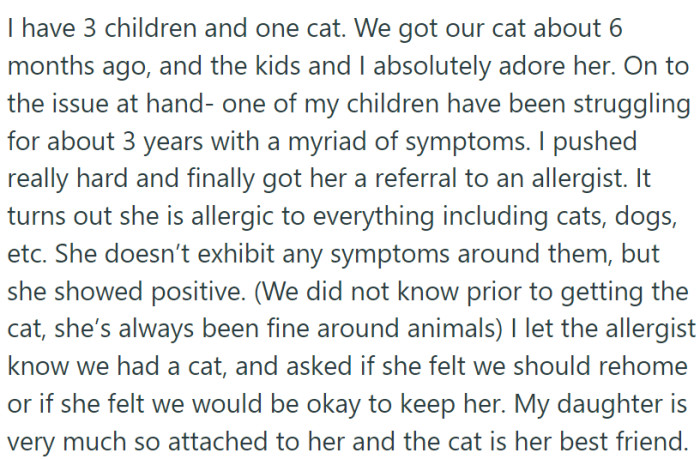
The child turned out to be allergic. The doctor said that it would be okay to keep the cat, but the extended family disagrees
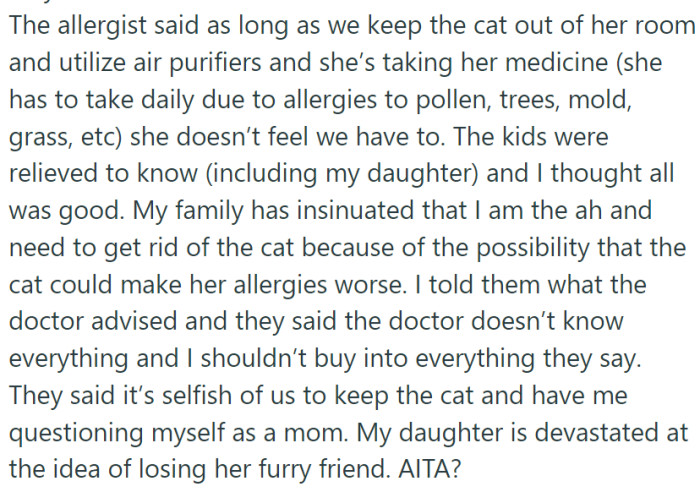
Attachment Theory and Pet Relationships
Attachment theory, as proposed by John Bowlby, illustrates how our relationships with animals can mirror our early human attachments.
For this mother, her daughter's bond with the cat may be a source of emotional stability, particularly during times of stress.
Research indicates that pets can provide unconditional support and reduce feelings of anxiety, which is especially pertinent in families navigating health concerns.
OP has offered the following explanation for why they think they might be the a-hole:

It is always great to have "experts" in your family...:)

Who needs doctors, right?

Developmental psychologists highlight the importance of secure attachments in childhood and how these relationships can impact emotional regulation.
A child's bond with a pet can foster empathy and social skills as they learn to care for another being.
This context underscores why the mother may hesitate to remove the cat, despite the allergy concerns.
People should listen to certified professionals
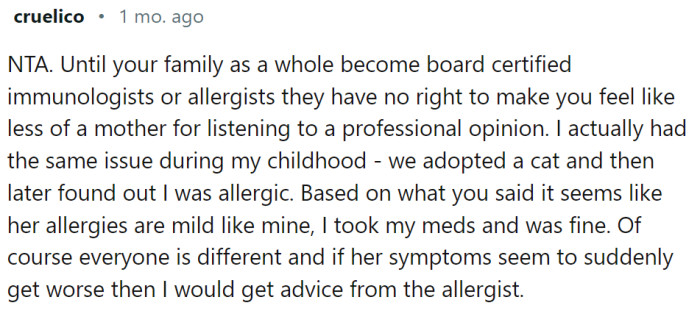
Some people simply need to feel superior
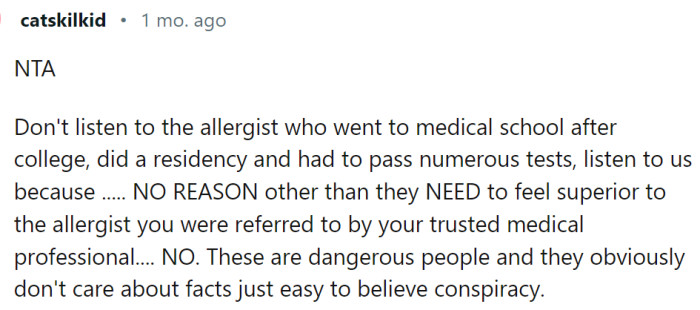
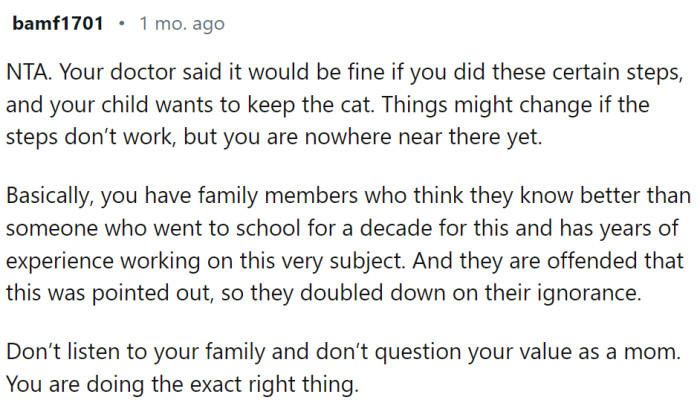
Balancing Health and Emotional Needs
When addressing health concerns like allergies, it’s crucial to consider both the physical and emotional implications.
Research from the American Academy of Pediatrics suggests that children can thrive emotionally, even in challenging health situations, provided they have strong support networks.
This highlights the need for empathy in making decisions that may affect a child’s emotional well-being.
"As long as your doctor says it's fine..."
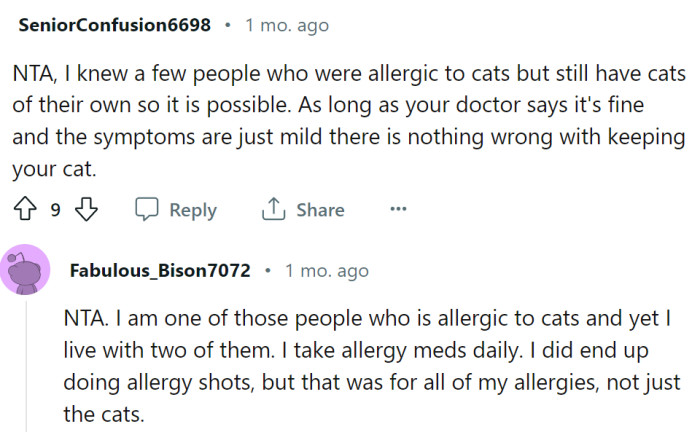
This is good advice:

This story really highlights the tough choices many families go through. Pets mean a lot to us, but we also have to look out for our family's health. It's super hard, especially when what the doctor says goes against what others think or feel.
In this story, the mom is stuck in the middle. She wants to listen to the doctor, but she also sees how much her daughter loves the cat and hears the worries of other family members.
Every family's situation is different, and making health decisions can be really complicated. At the end of the day, it's up to the family to figure out what's best.
They must consider the doctor's advice, how everyone feels, and what could happen in the long run. Talking openly, being kind to each other, and trying to understand everyone's point of view is key.
Because this story is all about a family doing their best for everyone, whether they walk on two legs or four.
One potential solution is to explore alternative allergy management strategies, such as air purifiers or specialized cleaning routines.
Studies show that these interventions can significantly reduce allergen levels and may allow the cat to remain in the home without compromising the child's health.
Encouraging this dialogue may help the family find a compromise that respects both health needs and emotional attachments.
Psychological Analysis
This situation really underscores the emotional weight of attachment, especially in children. The bond between the child and the cat likely provides her with comfort and stability amid her health struggles, which can be vital for emotional well-being. Balancing that emotional need with potential health risks can be challenging, and it highlights how family dynamics and external opinions complicate decision-making in such sensitive contexts.
Analysis generated by AI
Analysis & Alternative Approaches
Ultimately, the intersection of health and emotional needs requires careful consideration and open communication.
Dr. Mary Ainsworth's research on attachment styles illustrates that nurturing relationships can help children navigate emotional challenges effectively.
By fostering an environment of understanding, the family can work towards a solution that honors both the child's health and their emotional connections.



